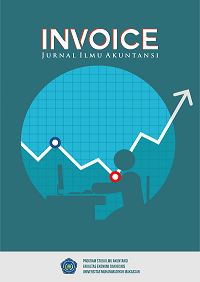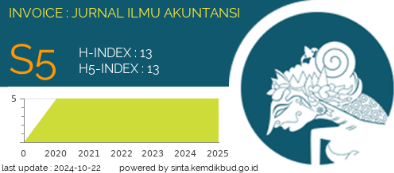The Influence of Whistleblowing, Forensic Accounting, Professional Skepticism, and Investigative Audits on Fraud Detection (A Study on Representatives of BPK and BPKP)
DOI: https://doi.org/10.26618/xkb1ka60
Abstract
This study examines the impact of whistleblowing, forensic accounting, professional skepticism, and investigative audits on fraud detection in the public sector, with a specific focus on auditors at the BPK and BPKP Representative Offices in Riau Province, Indonesia. The research adopts a quantitative design, using primary data collected through questionnaires distributed to all 95 auditors, applying a saturated sampling technique. Data analysis was conducted using multiple linear regression with IBM SPSS version 30. The findings demonstrate that whistleblowing, forensic accounting, professional skepticism, and investigative audits each have a significant and positive effect on fraud detection. Among these, professional skepticism and forensic accounting practices were identified as particularly influential factors in enhancing the ability of auditors to uncover fraud. The theoretical contribution of this study lies in expanding the literature on fraud detection in the context of emerging economies, emphasizing the role of whistleblowing mechanisms, forensic accounting tools, and auditors’ professional judgment. From a practical perspective, the results underscore the importance of improving auditors’ competencies through continuous training, strengthening investigative audit procedures, and promoting organizational cultures that encourage whistleblowing. These findings provide valuable insights for policymakers, auditing institutions, and scholars interested in improving the effectiveness of fraud detection within government auditing bodies. Ultimately, the study highlights the need for integrated strategies that combine technical, ethical, and organizational elements to enhance audit quality and accountability in the public sector.
References
Achyarsyah, P., & Rani, M. (2018). The influence of forensic accounting and investigative audit on the disclosure of financial reporting fraud. Jurnal Manajemen/Akuntansi, 5(2), 1–27.
Ardiansyah, S. S. (2023). The effect of whistleblowing, forensic accounting, and investigative audit in detecting fraud (A study at BPKP Riau Province). Jurnal Kajian Akuntansi dan Auditing, 19(2), 106–120.
Andriani, R., Rahmawati, & Kasran, M. (2018). The influence of forensic accounting and investigative audit on fraud detection (Study at BPKP Office in Makassar City). Repository Universitas Muhammadiyah Palopo, 2(2), 6.
Ardiansyah, A., Purnamasari, P., & Gunawan, H. (2016). Implementation of forensic accounting and investigative audit on fraud detection of asset misappropriation (Case study at the Financial and Development Supervisory Agency). Prosiding Akuntansi, 2(2), 695–701.
Arfiana. (2019). The influence of work experience, religiosity, and professional skepticism on the ability of internal auditors to detect fraud. Jurnal Akademik Pendidikan Ekonomi, 6(1), 99–106.
Arianto, B. (2021). Forensic accounting as a strategy for eradicating bribery corruption. Progress: Jurnal Pendidikan, Akuntansi dan Keuangan, 4(1), 1–16. https://doi.org/10.47080/progress.v4i1.1114
Batubara, E. D. (2018). Investigative audit on fraud detection. Jurnal Institusi Politeknik Ganesha Medan, 1(2), 1–8.
Batubara, E. D. (2020). Implementation of forensic accounting and investigative audit on fraud detection. Juripol (Jurnal Institusi Politeknik Ganesha Medan), 3(2), 9–16. https://doi.org/10.33395/juripol.v3i2.10776
Daurrohmah, & Urumsah. (2018). The effectiveness of forensic audit in detecting bribery with whistleblowing support. Retrieved from https://jkaa.bunghatta.ac.id/index.php/JKAA/article/download/111/60
Dewi, N. W. P., & Ramantha, I. W. (2016). Investigative ability in proving fraud by auditors. E-Jurnal Akuntansi, 15(2), 1029–1055.
Hasan. (2022). Analysis of students’ critical thinking skills through literacy activities. Jurnal Ideas, 8(1), 477–486.
Husna, N., Lailiyah, K., & Kurniawan, D. D. (2021). The synergy of the role of KPK and the community in preventing corruption of COVID-19’s social assistance fund. Jurnal Tata Kelola dan Akuntabilitas Keuangan Negara, 7(2), 169–185.
Jensen, M. C., & Meckling, W. H. (1976). Theory of the firm: Managerial behavior, agency costs, and ownership structure. Journal of Financial Economics, 3(3), 305–360. https://doi.org/10.1177/0018726718812602
Larasati, D., Andreas, & Rofika. (2020). Investigative audit techniques, experience, and auditor professionalism on fraud disclosure: Spiritual intelligence as moderator. Jurnal Akuntansi, Fakultas Ekonomi dan Bisnis, Universitas Riau, 1(1), 150–169.
Lestari, I. P., Widayanti, & Sukanto, E. (2019). Implementation of forensic accounting, investigative audit, effectiveness of whistleblowing system, and fraud prevention at BPKP Representative Office of Central Java Province. Prosiding Mahasiswa Seminar Nasional Unimus, 2, 558–563.
McConnell, D. K., & Banks, G. Y. (1997). Implementing new fraud auditing standard in your auditing practice. Ohio CPA Journal, July–September, 26–30.
Mulyadi, R., & Nawawi, M. (2020). The effect of forensic audit, investigative audit, and professionalism on fraud prevention (Empirical study at BPKP Banten Province). Jurnal Riset Akuntansi Terpadu, 13(2), 272. https://doi.org/10.35448/jrat.v13i2.9048
Panjaitan, I. A. (2018). Whistleblowing: Enhancing forensic audit results in revealing corruption by government auditors. Jurnal Institusi Politeknik Ganesha Medan, 1(1), 50–60.
Permana, Y., & Eftarina, M. (2020). The role of whistleblowing system in moderating the effect of professional skepticism on auditor’s ability to detect fraud. Prosiding Seminar Nasional.
Pratama, N. A., Sukarmanto, E., & Purnamasari, P. (2019). The effect of red flags and whistleblowing system on auditor’s ability to detect fraud (Empirical study on SOEs in Bandung). Prosiding Akuntansi.
Pratiwi, E. T., Abdullah, R., & Abdullah, L. O. D. (2019). Whistleblowing systems as an initial effort to prevent and detect fraud. Advances in Economics, Business and Management Research, 73(AICAR 2018), 22–26.
Putra, A. M., O., M. L., & Maemunah, M. (2017). The effect of investigative audit and whistleblowing system effectiveness on fraud prevention (Survey on SOEs in Bandung). Prosiding Akuntansi, 3(2), 183–187.
Rahmida, M. (2020). The role of whistleblowing on the effectiveness of forensic and investigative audits in detecting fraud moderated by gender and experience.
Rahman, B. (2020). Implementation of a whistleblowing system on fraud detection at PT JR (Case study of a state-owned enterprise in Indonesia). Dinasti International Journal of Management Science, 2(2).
Rahmayani, L. (2014). The influence of auditor’s ability, professional skepticism, audit techniques, and whistleblower on the effectiveness of investigative audit in revealing fraud (Empirical study at BPK and BPKP Riau Province). Jurnal Akuntansi, Fakultas Ekonomi Universitas Riau, 1(2), 1–15.
Ramos, M. (2003). Auditor’s responsibility for fraud detection. Journal of Accountancy, 195(1), 28–36.
Sugiyono. (2013). Metode penelitian pendidikan: Pendekatan kuantitatif, kualitatif, dan R&D. Bandung: Alfabeta.
Syahputra, B. E., & Urumsah, D. (2019). Fraud detection through effective government audit: Gender and experience multigroup analysis. Jurnal Akuntansi dan Bisnis, 19(1), 31–42. https://doi.org/10.20961/jab.v19i1.319
Putrie, V. S., & Farida, A. L. (2024). The influence of investigative audit, forensic accounting, and internal control systems in detecting fraud in goods and services procurement (Case study at BPKP DKI Jakarta). Jurnal Akuntansi, 11(6), 5616–5626.
Wiharti, R. R., & Novita, N. (2020). The impact of forensic accounting and investigative audit implementation in detecting fraud in goods/services procurement. Jurnal Ilmiah Akuntansi dan Humanika, 10(2), 115. https://doi.org/10.23887/jiah.v10i2.24698
Wakhidah, A. K., & Mutmainah, K. (2021). Bystander effect, whistleblowing system, internal locus of control, and competence of apparatus in detecting village fund fraud. Journal of Economic, Business and Engineering (JEBE), 3(1), 29–39.
Zimbelman, M. F. (1997). The effects of SAS No. 82 on auditors’ attention to fraud risk factors and audit planning decisions. Journal of Accounting Research, (Supplement), 75–97.
Downloads
Published
Issue
Section
License
Authors who publish with Invoice: Jurnal Ilmu Akuntansi agree to the following terms:
-
Copyright Ownership
The copyright of all articles published in this journal remains with the author(s). However, the authors grant Invoice: Jurnal Ilmu Akuntansi the right of first publication with the work simultaneously licensed under a Creative Commons Attribution 4.0 International License (CC BY 4.0). This license allows others to share, copy, redistribute, adapt, and build upon the work for any purpose, even commercially, as long as proper credit is given to the original author(s) and the source. -
Licensing and Access
Invoice: Jurnal Ilmu Akuntansi provides immediate open access to its content on the principle that making research freely available to the public supports a greater global exchange of knowledge. All published materials are available freely without subscription or payment and can be accessed, downloaded, and reused by any user provided that appropriate attribution is given. -
Permission for Reuse
For uses not covered by the CC BY 4.0 license, such as commercial reprints, translations, or any form of adaptation without clear attribution, users must obtain written permission from the editorial team. Requests for such permissions can be directed to the editorial office at: [invoice@unismuh.ac.id]. -
Plagiarism and Originality
Authors are responsible for the originality of their submissions. All articles are screened for plagiarism using appropriate tools before acceptance. Manuscripts found to contain unoriginal content or infringing materials will be rejected or retracted as per journal policy.














